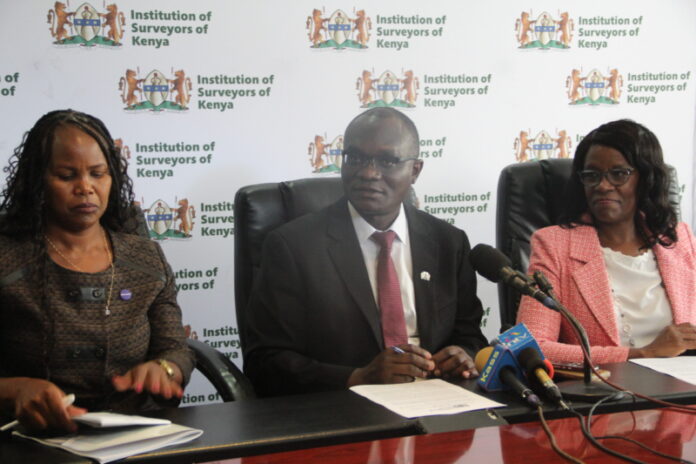The effects of climate change on land cannot be underestimated as it leads land degradation through drought, desertification and other extreme weather conditions that are increasing in frequency and intensity as the planet gets warmer.
The Institution Of Surveyors of Kenya (ISK) President Eric Nyadimo said the whole world was looking forward for ways to avert the impacts of climate change, and itsparamount that Surveying professionals understand how this impacts their practice and what they can do to help the globe to mitigate climate change issues.
Nyadimo was speaking in a press briefing Thursday, during the 8th ISK Africa Regional Conference held in Eldoret, Uasin Gishu, where land professionals and enthusiasts from across the continent meet to network and to deliberate on key climate change issues and how they affect the surveying profession.
The conference brought together Land and Built Professionals from 5 African countries, drawn from government institutions, private sector and the academia to discuss issues and challenges regarding climate change.
Nyadimo pointed out that surveyors play a crucial role on matters related to climate change like Environmental Impact Assessments, where they provide valuable information for environmental impact assessments by mapping and measuring land features and identifying areas that may be at the risk of environmental damage.
Surveyors are also key in mapping and monitoring land features such as rivers, lakes, wetlands, and forests, which are critical components of our ecosystems. The information gathered is used to track changes in the environment over time and develop strategies for protecting these resources.
“They also help in land use planning by identifying suitable areas for development and helping to minimize the impact on natural resources and at the same time help resolve boundary disputes, which can be important for protecting natural resources. For instance, if a dispute arises over the location of a property line next to a sensitive wetland, an accurate survey can help ensure that the wetland is not damaged,” he said.
The ISK president highlighted other key areas, where surveyors work is paramount like Resource Management in terms of providing crucial data for assessing and managing natural resources such as forests, water bodies and agricultural land. This enables Environmental scientists to obtain data to make informed decisions regarding land use and conservation efforts.
Additionally, when planning infrastructure projects like roads, bridges, or buildings, surveying ensures that these developments have minimal environmental impact, where environmental scientists help assess potential ecological consequences and recommend mitigation strategies.
Nyadimo further affirmed that the total amount of real estate exposed to the impacts of climate change is tremendous and that climate change affects valuations by decreasing net operating income (NOI) as well as impacting investor appetites for specific locations and property types.
He suggested that real-estate players can incorporate climate change risks into asset and portfolio valuations in order to thrive throughout the climate transition. This will require building the analytical capabilities to understand both direct and indirect physical and transition risks.
Other actions that the real estate players can adopt to thrive throughout the climate transition period is to decarbonize real-estate assets and portfolios and creating new sources of value and revenue streams for investors, tenants, and communities.
“We reinforce that Green buildings will help to reduce negative impacts on the natural environment by using less water, energy and other natural resources, employing renewable energy sources and eco-friendly materials and reducing emissions and other waste,” explained the ISK President.
Through this Conference, ISK sought to deepen the understanding of the surveying profession’s role by delving into the most pertinent issues at the intersection of sustainable land governance and climate change.
Themed Climate Resilient Surveying for Sustainable Land and Built Environment, the forum addressed 8 thematic areas including Carbon credit, mainstreaming climate change in land governance, the role of land sector professionals; Valuation, ecosystems & smart cities in relation to climate change; Geospatial technologies and trends for climate change monitoring; Affordable housing and financing; Natural resources management and climate change mitigation; Digital transformation in the land sector; Technological developments in geomatics; Climate resilient real estate developments; and Action for Africa on climate change in land and built environment.
“We call upon all stakeholders, from policymakers and industry leaders to students and citizens, to actively engage in climate change mitigation. Let us seize this moment as an opportunity to collaborate, innovate, and lead the charge towards a more sustainable future. It is through our shared commitment and action that we can forge a path to a greener, more resilient, and thriving Africa Continent,” he added.
The Institution of Surveyors of Kenya (ISK) is the professional body that brings together professionals who provide services in the Land built sector. The professionals fall within eight major disciplines of the surveying profession namely Land Surveying, Valuation, Building Surveying, Land Administration Management, Engineering Surveying, Geospatial Information Management, Estate Agents and Property Management.
By Ekuwam Sylvester and Luka Cherono



